What is Creatine & What Does Creatine Do?
Creatine is one of the most researched and effective supplements in sports nutrition, yet it remains misunderstood by many.
Some believe it’s a secret weapon for strength and muscle growth, while others worry about potential side effects like weight gain or bloating.
But what exactly is creatine, and how does it work?
At its core, creatine is a naturally occurring compound found in muscle cells that fuels high-intensity activities like sprinting, weightlifting, and jumping.
It also acts as an energy reservoir, helping your muscles generate power more efficiently.
Whether you’re an athlete looking for a competitive edge, a gym-goer aiming to push past plateaus, or even someone interested in brain health and longevity, creatine has a role to play.
Furthermore, despite its long-standing reputation as a go-to supplement for muscle building, research has revealed a range of benefits beyond just strength and performance.
Creatine enhances cognitive function, accelerates recovery, and may even have protective effects against neurological diseases.
Yet, myths and misconceptions still surround its use.
This article will break down what creatine is, how it works, its benefits, potential side effects, and the best ways to use it—so you can decide whether it’s the right supplement for you!
What is Creatine?
Creatine is a naturally occurring compound found in muscle cells. It is synthesized from three amino acids: arginine, glycine, and methionine.
The body produces small amounts of creatine, but most of it comes from dietary sources like red meat and fish.
However, supplementation is the most effective way to increase creatine stores in the muscles.
How Does Creatine Work?
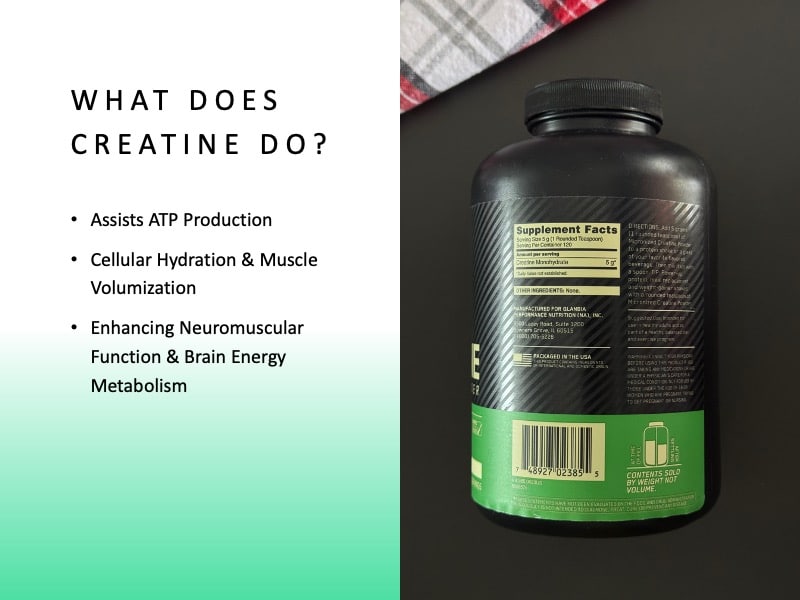
Creatine is a naturally occurring compound that plays a fundamental role in cellular energy metabolism, particularly in tissues with high energy demands, such as muscles and the brain.
Its primary function is to facilitate the rapid regeneration of adenosine triphosphate (ATP), the body’s primary energy molecule.
Assists ATP Production
ATP is the energy currency of the cell, responsible for driving all biological processes, including muscle contraction, nerve function, and biosynthetic reactions.
During high-intensity exercise, ATP is rapidly broken down to release energy, leaving behind adenosine diphosphate (ADP) and inorganic phosphate.
Since ATP stores are limited, muscles quickly become fatigued once ATP is depleted.
This is where creatine phosphate (phosphocreatine) comes into play.
Creatine is stored in muscle cells primarily in the form of phosphocreatine, which serves as an immediate energy reservoir.
When ATP levels drop, phosphocreatine donates a phosphate group to ADP, rapidly regenerating ATP through the creatine kinase reaction (Hultman et al., 1996).
This process allows muscles to sustain maximal effort for a longer duration, particularly in short bursts of high-intensity exercise such as sprinting, weightlifting, and jumping.
Cellular Hydration & Muscle Volumization
Beyond its role in energy metabolism, creatine increases intracellular water retention, leading to cellular volumizationand improved muscle function.
When creatine enters the muscle, it attracts water molecules, increasing muscle cell hydration.
This expansion stimulates mechanosensitive pathways that promote protein synthesis and muscle growth (Olsen et al., 2006).
Increased hydration also improves nutrient delivery and metabolic efficiency, further supporting muscle recovery and endurance.
Enhancing Neuromuscular Function & Brain Energy Metabolism
Creatine is not only beneficial for muscles but also for the brain, where it plays a role in neuroprotection, cognition, and mental fatigue resistance.
Brain cells also rely on ATP, and creatine supplementation has been shown to enhance cognitive performance, particularly in stressful or sleep-deprived conditions.
A study published in Neuropsychopharmacology found that creatine supplementation improved working memory and intelligence-related tasks by increasing ATP availability in the brain (Rae et al., 2003).
Furthermore, creatine’s antioxidant properties help protect neurons from oxidative stress, which has implications for neurodegenerative diseases like Alzheimer’s and Parkinson’s (Matthews et al., 1999).
Benefits of Creatine
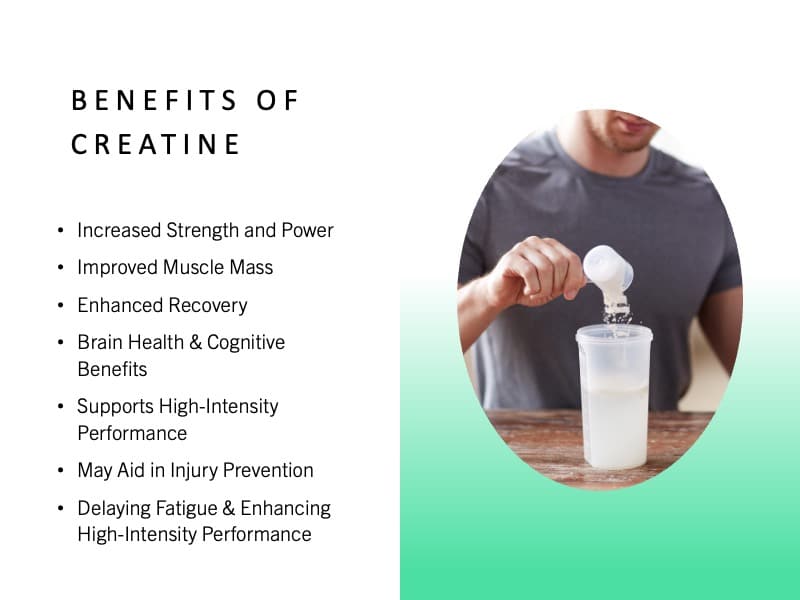
Creatine is one of the most well-researched supplements available and offers a wide range of scientifically proven benefits beyond just muscle strength and size.
From enhancing power output and promoting faster recovery to supporting cognitive function and potentially preventing injuries, creatine is an invaluable tool for both athletes and general health.
For optimal results, along with consuming a diet high in creatine-rich foods, consistently supplementing with 3-5 grams of creatine monohydrate daily can help maximize these benefits.
Whether you’re an athlete looking for a competitive edge or simply seeking to improve overall health, creatine is a safe, effective, and essential addition to your regimen.
Increased Strength and Power
Creatine is widely recognized as one of the most effective supplements for improving strength and power output, making it a staple for athletes and gym-goers.
Studies have consistently shown that supplementing with creatine monohydrate enhances performance in high-intensity, short-duration exercises like weightlifting and sprinting.
A meta-analysis published in the Journal of Strength and Conditioning Research found that creatine supplementation led to a 5-15% increase in maximal strength and power output across various strength training exercises (Kreider et al., 2017).
This improvement is primarily due to creatine’s role in replenishing ATP stores, which fuels muscle contractions during explosive movements.
Additionally, research in Medicine & Science in Sports & Exercise demonstrated that creatine supplementation significantly improved 1-rep max strength in compound lifts like squats and bench presses (Branch, 2003).
These findings confirm that creatine enhances both anaerobic power and overall strength performance.
Improved Muscle Mass
Creatine is well-documented for its ability to increase lean muscle mass by promoting muscle hydration, increasing protein synthesis, and reducing muscle breakdown.
A study in the International Journal of Sports Nutrition and Exercise Metabolism showed that participants supplementing with creatine gained 2-4 pounds of lean muscle mass over a 4-12 week period, compared to a placebo group (Volek et al., 1999).
The primary mechanism behind this is cell volumization, where creatine draws water into muscle cells, leading to increased intracellular hydration and stimulating muscle growth.
Furthermore, creatine has been found to increase satellite cell activation, which plays a key role in muscle regeneration and hypertrophy (Olsen et al., 2006).
This means creatine not only increases muscle size but also enhances the body’s ability to build and repair muscle tissue over time.
Enhanced Recovery
Creatine is one of the best supplements for muscle recovery and it plays a significant role in post-exercise recovery by reducing muscle damage, inflammation, and oxidative stress.
This results in faster recovery times between workouts and improved overall training capacity.
A study in Amino Acids found that creatine supplementation reduced muscle damage markers such as creatine kinase (CK) and lactate dehydrogenase (LDH), which are associated with exercise-induced muscle breakdown (Rawson & Volek, 2003).
This suggests that creatine helps mitigate post-exercise muscle soreness and accelerates tissue repair.
Additionally, research in The Journal of the International Society of Sports Nutrition demonstrated that creatine supplementation reduced inflammation markers (C-reactive protein) and oxidative stress in endurance athletes, leading to improved recovery rates (Santos et al., 2004).
Brain Health & Cognitive Benefits
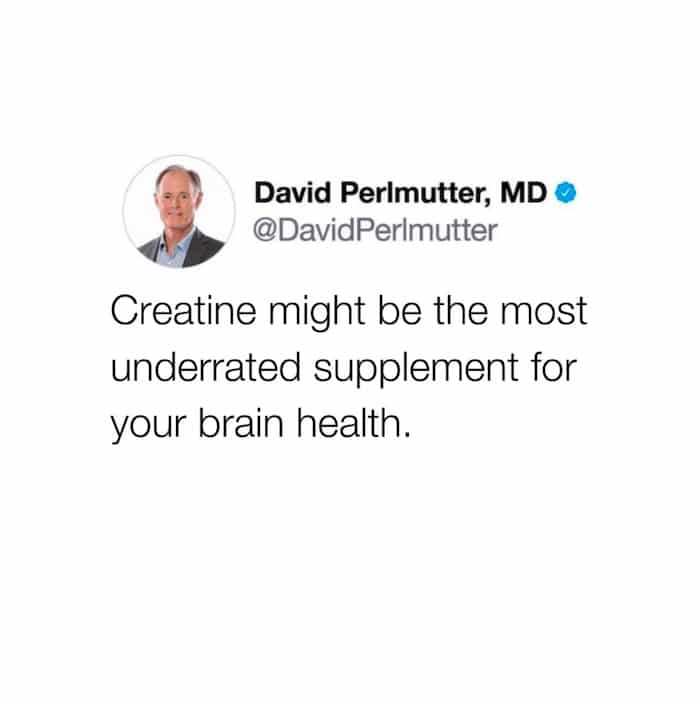
While creatine is primarily known for its benefits in muscle function, emerging research suggests that it also plays a crucial role in brain health, cognitive performance, memory, mental fatigue reduction and may reduce symptoms of brain fog.
This is especially beneficial for older adults and individuals under high cognitive stress.
The brain requires large amounts of ATP for optimal function, and creatine helps sustain energy production in neurons.
A study published in Psychopharmacology found that creatine supplementation improved memory and cognitive function in vegetarians, who often have lower creatine stores due to limited dietary intake (Benton & Donohoe, 2011).
Another study in Neuropsychology found that older adults supplementing with creatine experienced reduced mental fatigue and improved reaction time during cognitive tasks (McMorris et al., 2007).
There is also evidence suggesting that creatine may have neuroprotective properties.
Research in Experimental Gerontology showed that creatine supplementation helped protect brain cells against oxidative stress and neurodegenerative diseases like Alzheimer’s and Parkinson’s (Matthews et al., 1999).
Supports High-Intensity Performance
Creatine is essential for activities that require short bursts of maximum effort, such as sprinting, weightlifting, jumping, and combat sports. Since creatine replenishes ATP levels rapidly, it allows athletes to sustain peak performance for longer durations.
A study in The Journal of Applied Physiology found that creatine supplementation improved sprint speed, jump height, and repeated power output in elite athletes (Casey et al., 1996).
Similarly, a review in Sports Medicine concluded that creatine enhances anaerobic capacity, allowing athletes to push through high-intensity workouts with greater endurance (Cooper et al., 2012).
May Aid in Injury Prevention
Several studies suggest that creatine supplementation can help reduce muscle cramps, dehydration, and injury risk, particularly in endurance athletes and individuals exposed to extreme temperatures.
A study in The Journal of Athletic Training found that creatine supplementation reduced the incidence of muscle cramps and heat-related illnesses in football players during preseason training in hot climates because the hydration-enhancing properties of creatine contribute to better thermoregulation and electrolyte balance (Dalbo et al., 2008).
Furthermore, research published in The American Journal of Sports Medicine found that athletes supplementing with creatine experienced a lower rate of muscle strains and ligament injuries compared to those who did not take creatine (Greenwood et al., 2003).
The proposed mechanism is that creatine improves muscular endurance and resistance to fatigue, which lowers the likelihood of overuse injuries.
Delaying Fatigue & Enhancing High-Intensity Performance
Since ATP regeneration is the limiting factor in short-duration, high-power activities, having higher phosphocreatine stores allows athletes to perform more repetitions, sprint longer distances, or lift heavier weights before reaching fatigue.
A meta-analysis published in Medicine & Science in Sports & Exercise found that creatine supplementation significantly improved peak power output, maximal strength, and repeated sprint ability, particularly in anaerobic sports (Branch, 2003).
This effect is due to the increased capacity of the phosphagen system, which is crucial for energy production during intense exertion.
Additionally, creatine enhances muscle endurance by buffering hydrogen ions (H⁺) produced during anaerobic glycolysis.
This helps delay muscle acidosis, which is a major contributor to fatigue in high-intensity exercise (Balsom et al., 1994).
Best Sources of Creatine – Should You Get Creatine From Food or Supplements?
Creatine is naturally found in certain foods, primarily animal products, and can also be obtained through supplementation.
While food sources provide natural creatine, you would need to eat 2-3 pounds of meat or fish daily to match the levels from supplementation.
For most people, combining a balanced diet with 3-5 grams of creatine monohydrate per day is the most effective approach.
Below are the best dietary and supplemental sources of creatine:
Best Food Sources of Creatine
- Red Meat (Beef, Bison, Lamb) – One of the richest natural sources, with about 1-2 grams of creatine per poundof raw meat.
- Fish (Salmon, Tuna, Herring, Cod) – Provides 1-4.5 grams per pound, depending on the type.
- Pork – Contains a similar amount of creatine as beef, making it a solid option.
- Chicken & Turkey – While lower in creatine than red meat, poultry still provides a moderate amount.
- Organ Meats (Liver, Kidney, Heart) – These nutrient-dense meats offer a natural creatine boost.
Note: Since cooking can degrade creatine, consuming these foods medium-rare or in raw preparations (like sushi or tartare) may preserve more creatine.
What is the Best Type of Creatine
If getting enough creatine from food alone is challenging, supplements are an easy and effective way to boost levels.
The most researched and effective form of creatine is creatine monohydrate. It is affordable, well-absorbed, and backed by numerous studies.
Other forms like micronized creatine, creatine hydrochloride (HCL), and creatine ethyl ester claim to offer better absorption, but there is limited evidence to support their superiority over monohydrate.
- Creatine Monohydrate – The gold standard in creatine supplements. Well-researched, affordable, and highly effective. Micronized creatine monohydrate is a more refined version of creatine monohydrate that dissolves better in water and may reduce bloating.
- Creatine HCL (Hydrochloride) – Known for improved solubility, requiring smaller doses with less water retention.
- Buffered Creatine (Kre-Alkalyn) – Marketed as a more pH-stable form, though research does not show significant advantages over monohydrate.
- Creatine Ethyl Ester (CEE) – A form designed for better absorption, but studies suggest it is less effective than monohydrate.
- Creatine Blends – Some supplements combine creatine with amino acids or HMB for added benefits, such as Transparent Labs Creatine HMB.
Best Creatine Supplements
Choosing the right creatine supplement is essential for maximizing performance, muscle growth, and overall health benefits.
While creatine monohydrate remains the gold standard due to its extensive research backing, various brands, and formulations offer additional features that may suit different needs.
Below are some of the best and most reputable creatine supplements available today.
Optimum Nutrition Creatine Monohydrate
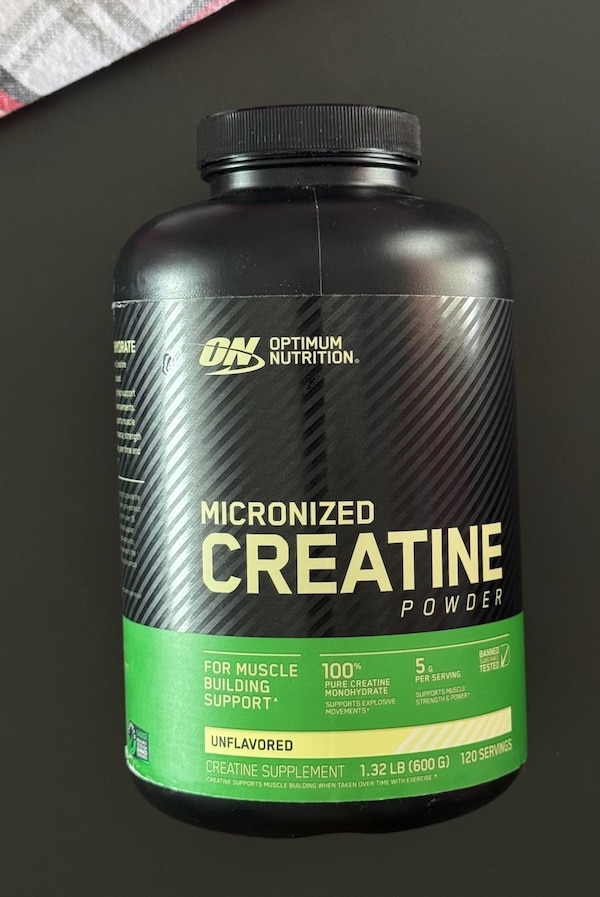
Optimum Nutrition Creatine Monohydrate is one of the most well-reviewed and widely used creatine supplements.
It contains 100 percent pure micronized creatine monohydrate, which improves solubility and absorption.
One of my favorite aspects of Optimum Nutrition Creatine Monohydrate is that it is NSF-certified and tested for banned substances, making it safe for athletes in competitive sports.
It is suitable for athletes, bodybuilders, and general fitness enthusiasts looking for a reliable, no-nonsense creatine source.
The serving size is one teaspoon (five grams) per scoop.
Last update on 2025-07-11 / This article includes affiliate links/Images via Amazon Product Advertising API. I may earn commissions on purchases made through these links.
Bulk Supplements Creatine Monohydrate
Bulk Supplements Creatine Monohydrate is an affordable and high-quality option for those who want bulk creatine at a lower price.
It contains no additives, fillers, or artificial ingredients and is pure, unflavored creatine monohydrate. Bulk Supplements Creatine Monohydrate is lab-tested for purity and potency to ensure safety and effectiveness.
Although I like Optimum Nutrition Creatine Monohydrate the best, Bulk Supplements Creatine Monohydrate is suitable for anyone looking to buy creatine in bulk at an affordable price without sacrificing quality.
Last update on 2025-07-11 / This article includes affiliate links/Images via Amazon Product Advertising API. I may earn commissions on purchases made through these links.
Thorne Research Creatine
Thorne Research Creatine is NSF Certified for Sport, ensuring it is free from banned substances and contaminants.
It contains highly pure, micronized creatine monohydrate for enhanced solubility and is a reputable pharmaceutical-grade supplement trusted by professional athletes.
Thorne Research Creatine is suitable for elite athletes, competitive lifters, or individuals who want third-party-tested creatine with no artificial ingredients.
Last update on 2025-07-11 / This article includes affiliate links/Images via Amazon Product Advertising API. I may earn commissions on purchases made through these links.
Transparent Labs Creatine HMB
Unlike the other supplements on my list, Transparent Labs Creatine HMB combines creatine monohydrate with HMB (β-Hydroxy β-Methylbutyrate) to reduce muscle breakdown and enhance recovery.
It contains no artificial colors, sweeteners, or preservatives and helps reduce muscle loss while promoting lean mass growth.
Last update on 2025-07-11 / This article includes affiliate links/Images via Amazon Product Advertising API. I may earn commissions on purchases made through these links.
Safety Considerations – Is Creatine Safe?
Yes, creatine is one of the safest and most well-studied supplements available.
Research spanning decades has found no evidence of harm in healthy individuals.
However, those with pre-existing kidney conditions should consult a healthcare provider before taking creatine.
Creatine Side Effects
Most users experience no side effects. However, some individuals report:
- Water Retention – Creatine pulls water into muscle cells, which can cause slight weight gain.
- Digestive Issues – High doses may cause bloating or stomach discomfort.
- Muscle Cramps or Dehydration – These are rare and often due to inadequate hydration.
Does Creatine Cause Hair Loss?
There is no definitive evidence that creatine causes hair loss.
One small study suggested it might increase dihydrotestosterone (DHT), a hormone linked to hair loss, but no follow-up research has confirmed these findings.
Does Creatine Make You Gain Weight?
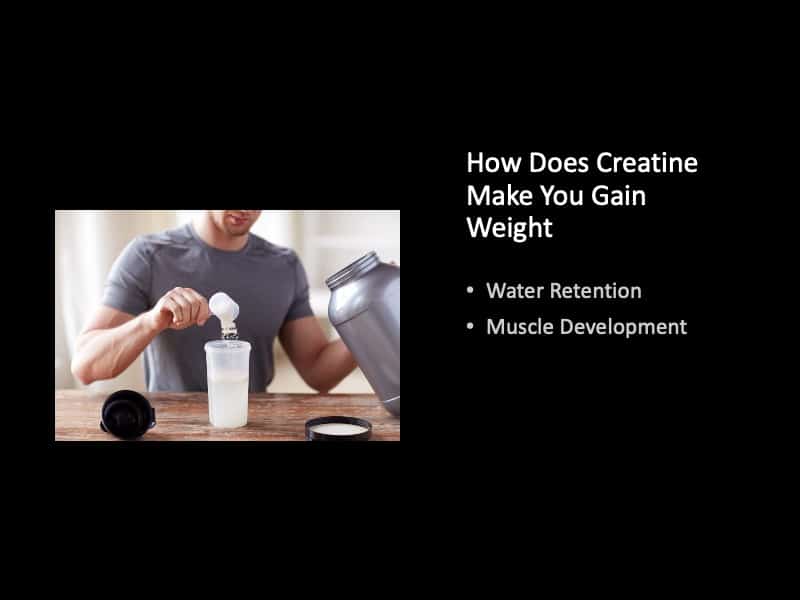
Creatine does not cause fat gain, but often, creatine does make you gain weight because it increases muscle mass and water retention.
However, you can take creatine if you are trying to lose belly fat or improve your body composition because creatine does not produce fat gain and actually can help with long-term weight loss efforts due to increased lean muscle development.
Is Creatine Okay for Women?
The use of creatine monohydrate for women is often debated due to concerns about water retention and increased muscle development.
However, research shows that women can benefit from creatine just as much as men, enhancing strength, endurance, and overall performance without unwanted bulk.
Creatine is just as effective for women as it is for men. It can support muscle tone, strength, endurance, and cognitive function without causing excessive bulk.
Is Creatine a Steroid?
No, creatine is not a steroid. It is a naturally occurring compound that supports energy production, unlike anabolic steroids, which manipulate hormones.
How to Take Creatine
- Loading Phase (Optional): 20 grams per day (split into four doses) for 5-7 days.
- Maintenance Phase: 3-5 grams per day.
- With or Without Food? – Taking creatine with a carbohydrate or protein source may enhance absorption.
When to Take Creatine
The best time to take creatine is a widely debated topic. Options include:
- Before a Workout – Provides immediate energy availability.
- After a Workout – May enhance muscle recovery.
- Anytime Daily – The key factor is consistency rather than timing.
Creatine Loading Phase – Necessary or Not?
A loading phase (20g per day for 5-7 days) saturates muscles faster, but it is not necessary. Taking 3-5 grams daily will achieve the same saturation over a few weeks.
Does Creatine Expire?
Creatine has a long shelf life, often lasting years if stored in a cool, dry place. It does not expire in the way food does but may degrade into creatinine over time, reducing its effectiveness.
Final Thoughts: The Role of Creatine in Health & Performance
Creatine is far more than just a muscle-building supplement; it plays a crucial role in both physical performance and overall health.
As one of the most researched and well-supported supplements available, creatine has been shown to enhance strength, power, endurance, and recovery, making it a valuable tool for athletes and fitness enthusiasts alike.
Beyond its benefits for muscle growth and exercise performance, creatine has also gained recognition for its positive effects on brain health, cognitive function, and neurological protection.
Research suggests that creatine supplementation may improve memory, mental clarity, and resistance to fatigue, particularly in individuals with higher cognitive demands or those following plant-based diets.
One of the biggest misconceptions about creatine is that it causes bloating, dehydration, or weight gain, leading some people—especially women—to avoid it unnecessarily.
However, studies consistently show that creatine monohydrate is safe, well-tolerated, and beneficial for both men and women, regardless of fitness level.
For anyone looking to optimize workout performance, recovery, and long-term health, supplementing with 3-5 grams of creatine monohydrate daily is a simple yet effective strategy. Whether your goal is to lift heavier, sprint faster, enhance brain function, or support healthy aging, creatine remains one of the most effective and scientifically backed supplements available.
This website does not provide medical advice. This website site does contain affiliate links, and purchases may earn a commission.
Read my Medical Disclaimer, Review Disclaimer, and Publishing Policies for more details. Use of this site indicates acceptance of these terms.







